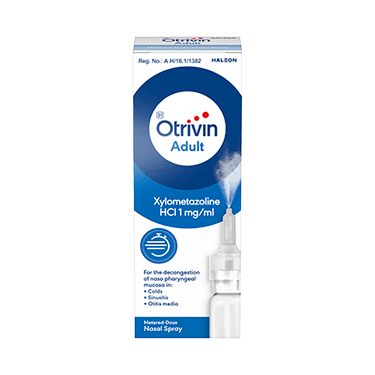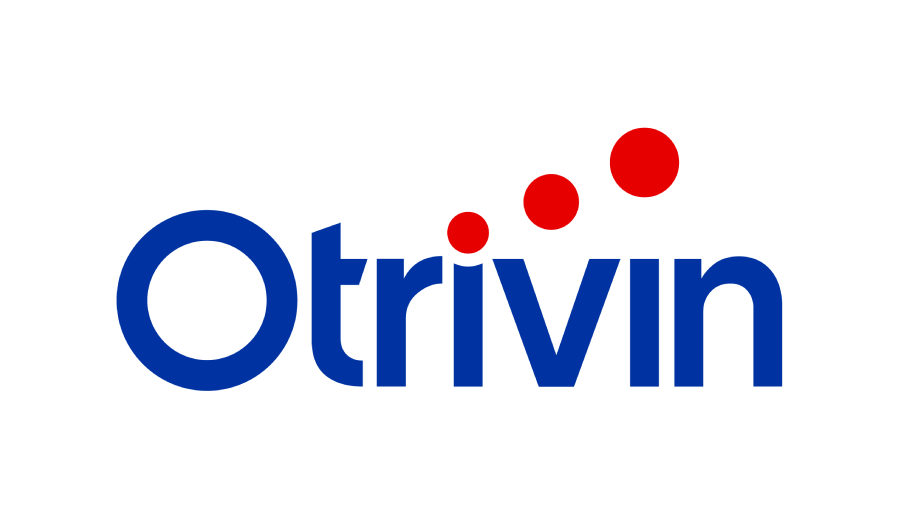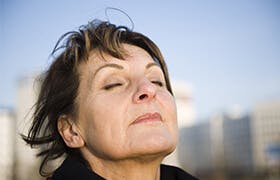
How can I help prevent air pollution?
While air pollution reduction is important, the first line of defence is your nose1,2, which is a natural filter.2 Air pollution can damage this filter. That is why it is so important to look after your nose.
Otrivin Adult MD Spray helps to clear your nose and restore your natural nasal defences. It helps to wash out pollutants trapped in your nose.7
Want to protect yourself from air pollution exposure? Here are 6 top ways:
- Public health websites are there to help you check the air quality in your local environment. You can check them out online to see the air pollution levels each day, so you know exactly what you’re dealing with. Sometimes you might need to delay any plans to stay outdoors all day until the air improves.5
- Plan your day. If you live in an area where there’s heavy traffic, wherever possible, plan your regular outdoor activities outside of commuter times so you avoid air pollution levels at their peak.5
- Wear a face mask. Make sure it has a filter that can remove harmful fine particles as well as large ones.5
- Drive mindfully. If you drive, try to avoid peak times so you don’t breathe in the pollution while you’re queuing in traffic. Close your car windows to stop exhaust fumes getting in.5
- Not all air pollution will come from outside the home. Surprising as it sounds, volatile organic compounds (VOC) emitted from indoor decorating and refurbishing materials, as well as wooden furniture, are recognised as some of the main causes of bad indoor air quality.6
- If you are very concerned about indoor pollution in your immediate environment, consider using an air purifier.7
Interested in air pollution prevention? Here are 4 top ways:
- Become more aware of your daily decisions and the products you use. For example, is there fossil burning involved? Even decisions such as when to use the central heating, could make a difference.5
- Consider taking public transport or using an electric vehicle.5 Thinking about the carbon dioxide emission of your vehicle can also save money since the vehicle road tax you are charged can take this into account.
- Consider alternatives to using an air conditioner as regular or prolonged usage has a bad impact on global warming.8
- Use LED lights where possible for energy efficiency.5
Can the nose filter pollution?
Your nose is the first part of your airway that pollution hits.4 And it does an incredible job of filtering particles from the air you breathe by trapping them in the nasal mucus and hairs.5 But air pollution can cause swelling of the nose lining which can result in congestion.6
Why should I use Otrivin Adult MD Spray?
Otrivin Adult MD Spray helps to wash-out pollution trapped in your nose and helps it protect your body from pollutants.
What is the impact of pollution?
A wider effect of air pollution is climate change, particularly global warming. The burning of fossil fuels produces nitrogen dioxide and greenhouse gases (carbon dioxide is an example of a greenhouse gas). Nitrogen dioxide is released into the air from motor vehicles, power plants and off-road equipment.1
Greenhouse gases contribute to the greenhouse effect. The burning of fossil fuels can produce other problematic environmental effects that are felt, such as acid rain. While acid rain can be caused by natural sources such as volcanoes, most of it comes from the burning of fossil fuels.

References:
- Eccles R. A role for the nasal cycle in respiratory defence. Eur Respir J 1996;9(2):371–6.
- Shusterman D. The effects of air pollutants and irritants on the upper airway. Proc Am Thorac Soc 2011; 8(1):101–5.
- Bastier PL, et al. Nasal irrigation: From empiricism to evidence-based medicine. A review. Eur Ann Otorhinolaryngol Head Neck Dis 2015;132(5):281–5.
- Rabago D, Zgierska A. Saline nasal irrigation for upper respiratory conditions. Am Fam Physician 2009; 80(10):1117–9.
- World Health Organisation. Actions for individuals
- WHO Guideline for indoor air quality: Selected pollutants (pg104, 112, 113). Available at: http://www.euro.who.int/__data/assets/pdf_file/0009/128169/e94535.pdf (last accessed April 2020)
- Batterman S, et al. Particulate matter concentrations in residences: an intervention study evaluating stand-alone filters and air conditioners. Indoor Air 2012;22:235–52.
- World Health Organisation Housing Strategies. Available at: https://www.who.int/sustainable-development/housing/strategies/air-conditioning/en/ (last accessed April 2020)
- Papsin B, McTavish A. Saline nasal irrigation. Its role as an adjunct treatment. Can Fam Physician. 2003; 49:168–73
Show all references
Close references






